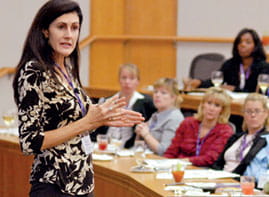A new president may revisit whether the private market is the best fuel for U.S. energy plans
1/2/2009 - The incoming Obama administration will list combating climate change high on its policy agenda when it takes office, although the policy that is most likely to result might take an entire presidential term to implement fully, according to two Kellogg School faculty members who focus on environmental policy and its economic impacts.
Associate Professor Ben Jones sees a cap-and-trade system for carbon, in which a fixed number of permits to issue carbon emissions are traded on the open market like a stock, as the most likely scenario for working to limit global warming.
Although such a system might seem politically problematic during a recession, given estimates that it would raise coal-fueled energy prices from 15 percent to 30 percent, the recession likely will be over before the system comes fully online due to the complexities in the numbers and types of carbon sources, says Jones, a member of the Kellogg School’s Management and Strategy Department whose research also includes national leadership, higher education and development economics.
“The implementation process here is going to be pretty extensive,” agrees Lynne Kiesling, senior lecturer in the Kellogg social enterprise curriculum. “The ability to move speedily is limited.”
Economists and policymakers have been debating the differences between the cap-and-trade system and a straight tax on carbon, which would be simpler to implement, Jones says. With the tax, policy directly affects the price, whereas with cap-and-trade, it exerts a more indirect effect by controlling the supply and letting the market find the right price, he explains.
“They’re theoretically equivalent, in a perfect world, with no transaction costs or political economy,” Kiesling says. “A lot of economists would argue for a carbon tax because it doesn’t seem as manipulable in the political process. I’m probably one of the few economists who would say the tax code is pretty manipulable, too.”
Although the coal industry and companies with coal-fired capacity might not like the idea of limiting carbon emissions, Jones says, from a business standpoint the justification is that such pollution amounts to a “negative externality” — a cost that is imposed broadly on society but that is not reflected in what the consumer pays for a good or service.
“The private market doesn’t get it right. These things are too cheap,” he says. “Private firms and individuals don’t account for the environmental damage that’s caused. That might be the reason why it’s good for the economy overall, even if it’s bad for certain sectors.”
There could also be positive impacts on the economy if limiting carbon emissions reduces U.S. dependence on foreign oil, which could improve the nation’s security, Jones says.
Kiesling points out the influence of consumer demand on the energy market. “The only way we’re going to reduce our dependence on foreign oil is to consume less oil, period,” Kiesling says. “The more we’re using electricity to fuel our transportation, the more that tends to be fueled by domestically generated fuels.”
Beyond the focus on carbon, another way in which the new administration could dramatically alter environmental and energy policy is through the economic stimulus package of up to $1 trillion that is under discussion and likely to land on President-elect Obama’s desk on day one, Jones says.
“From a public, government point of view, it’s a time of enormous opportunity,” he says. “There are a number of things the Obama team can do that make sense from a public investment point of view, the kinds of thing the private sector isn’t going to do.”
For example, he says, the federal government could subsidize the purchase of higher-gas-mileage or hybrid cars. “You then radically readjust the stock of transportation vehicles in the United States toward much higher fuel efficiency,” Jones says, “which dramatically reduces oil consumption [and] creates demand for the car companies. You’re dealing with a number of things we want to do, simultaneously.”
Other areas that offer potentially beneficial intersections are those between energy and low-income-housing policies and another industry in trouble, home renovation, Kiesling says. The government could subsidize better insulation and other energy-saving technologies being put into public or subsidized housing, lowering energy bills, providing work for unemployed construction workers, and helping the environment all at once, she says.
With all such recession-fighting policies, Kiesling emphasizes, the government should proceed with two cautions. “Once you have a program in place, it takes on a certain inertia – it gains a constituency, and it’s hard to get rid of the policy. We have to be careful about creating these permanent entitlements in this area,” she says. “We also have to be careful of the ‘make-work’ project. We run the risk of having a broken-windows policy, where we think we’re creating value by breaking a window and paying someone to fix it. There is an opportunity cost.”






